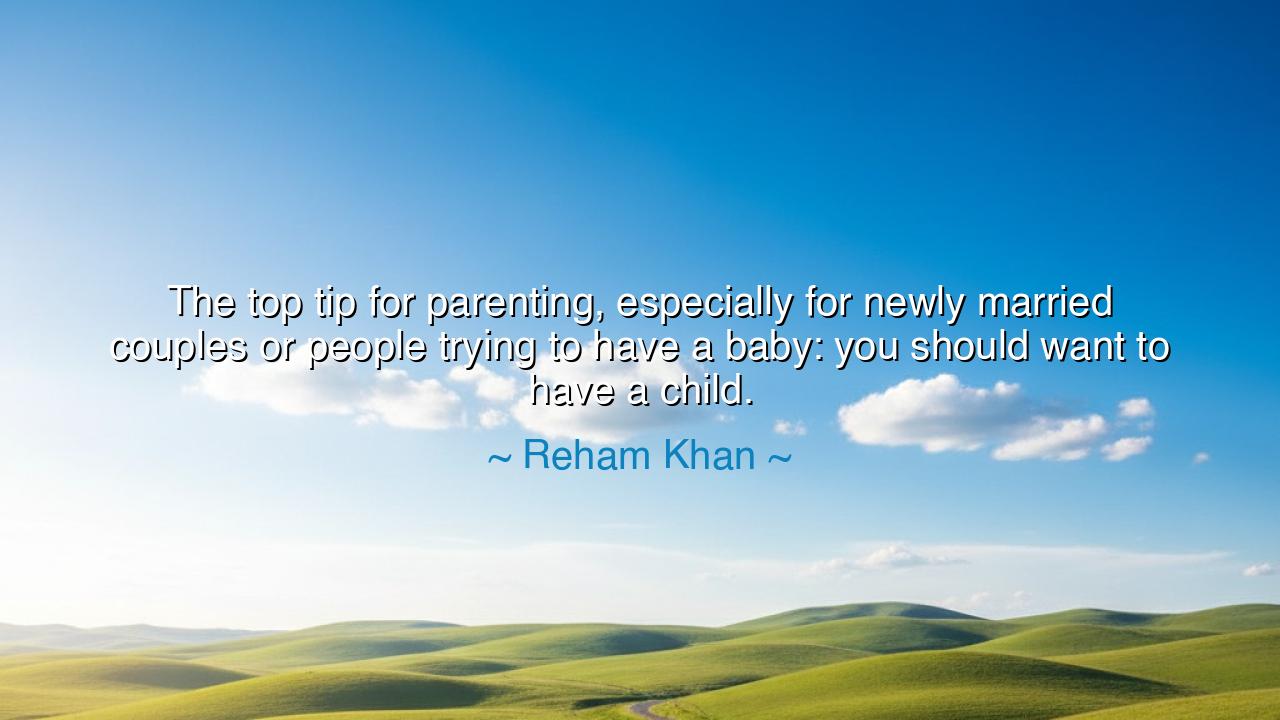
The top tip for parenting, especially for newly married couples
The top tip for parenting, especially for newly married couples or people trying to have a baby: you should want to have a child.






When Reham Khan declared: “The top tip for parenting, especially for newly married couples or people trying to have a baby: you should want to have a child,” she spoke words that strike at the very heart of what it means to bring life into the world. For in every age, men and women have become parents for many reasons — duty, expectation, tradition, even chance. Yet Khan reminds us that the foundation of parenting is not obligation, nor the pressure of society, but the desire — the deep and willing choice — to welcome and nurture a new soul. Without this desire, the work of raising a child risks becoming a burden rather than a blessing.
In ancient times, children were often seen as heirs, as laborers for the field, or as offerings to ensure lineage continued. Yet the truest gift a parent can give is not simply their bloodline, but their willing heart. To want a child is to begin the journey with joy rather than resentment, with purpose rather than mere survival. It is to say, “I choose to love, I choose to protect, I choose to guide.” That choice becomes the seed of resilience when the storms of sleepless nights, hardship, or worry descend.
Consider the tale of Abraham and Sarah, who longed for a child but waited many years before Isaac was born to them. Their desire for a child was not shallow, but profound, and when the child finally came, they poured into him the fullness of their joy and faith. Contrast this with the rulers of old who fathered children only to secure alliances or power. Those children were too often neglected, raised without the warmth of a willing parent, treated as pawns instead of beloved souls. The difference between wanting a child and simply having one is the difference between love and duty, between nurture and neglect.
Khan’s words reveal a truth that often lies hidden: to raise a child is to carry a lifelong labor. There will be nights without sleep, days filled with tears, and seasons of sacrifice. If one enters into this journey unwillingly, the weight may feel unbearable. But if one begins with the fire of desire, even hardships become part of love’s offering. The parent who wants their child endures the storms with patience, because the labor is chosen, and chosen love is stronger than fate.
This saying also speaks to the freedom of choice. In times past, many had no say in whether they became parents. Women especially bore the expectation to mother without question, regardless of their readiness or desire. But in this age, Khan reminds us: couples should ask themselves first, “Do we truly want this child?” For children are not mere extensions of ourselves; they are souls deserving of parents whose hearts are prepared to love them fully.
The lesson for us, O listeners, is clear: do not step into parenting unprepared, nor from compulsion. Reflect, ask, and choose. The greatest injustice to a child is to be born into unwilling arms. But the greatest gift is to be received into a home where their very existence was longed for. Thus, the first act of good parenting is not after the child is born, but before: in the decision to want them.
Practical actions follow: couples should speak honestly with one another about their readiness for parenthood. Let not family or tradition force them into haste. Seek counsel, weigh the burdens, but also embrace the joy. Prepare not only the home and the cradle, but the heart. For a child is not merely fed by bread and clothed by fabric; they are fed by being wanted, clothed in the security of chosen love.
So let Reham Khan’s words be passed down as wisdom: the top tip for parenting is not a method, not a technique, but the very root of all — the will to love a child into being. Let every generation remember: the journey of parenting begins not with birth, but with desire. To each parent who chooses willingly, their children shall rise as blessings, not burdens, and the world itself shall be brighter for it.






AAdministratorAdministrator
Welcome, honored guests. Please leave a comment, we will respond soon